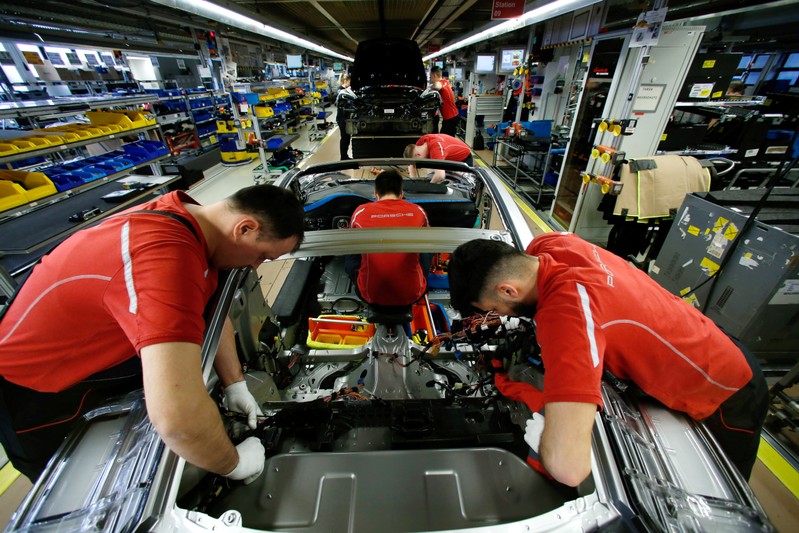
FILE PHOTO: Employees of German car manufacturer Porsche work on a Porsche 911 at the Porsche factory in Stuttgart-Zuffenhausen, Germany, February 19, 2019. REUTERS/Ralph Orlowski/File Photo
October 1, 2019
By Michael Nienaber
BERLIN (Reuters) – Germany’s manufacturing recession deepened in September with factories recording their weakest performance since the world financial crisis a decade ago, a survey showed on Tuesday.
The bleak manufacturing figures from IHS Markit’s Purchasing Managers’ Index (PMI) also suggested that the crisis in the export-dependent industrial sector is starting to take its toll on other sectors of Europe’s largest economy.
Germany’s export-reliant manufacturers are suffering from a slowing world economy and business uncertainty linked to a trade dispute between the United States and China as well as Britain’s planned but delayed exit from the European Union.
The final PMI for manufacturing, which accounts for about a fifth of the German economy, fell to 41.7 in September from 43.5 the previous month. This was the lowest reading since 2009 when the global financial crisis pushed the German economy into a contraction of nearly 6%.
“The downward trend in new orders, which fell the most in more than 10 years, is a particular worry, and continues to drive cutbacks in factory output, employment and prices,” IHS Markit economist Phil Smith said.
The job losses in manufacturing broadened in September, reaching a scale at which they could start to weigh more heavily on so far relatively resilient consumer morale, Smith said.
The weakness seen for a long time across the intermediate and investment goods sectors also showed signs of spreading to consumer products, he added.
Germany’s leading economic institutes will on Wednesday lower their economic growth forecasts for this year and next, sources told Reuters on Monday, adding to fears that the recession among export-driven manufacturers is spreading.
The institutes expect the German economy to grow by 0.5% this year and by 1.1% in 2020, sharply down from their April forecasts of 0.8% and 1.8% respectively, the sources said.
Economic data released on Monday helped to allay fears that the economy could enter a technical recession in the third quarter after contracting by 0.1% in the second quarter.
German unemployment fell unexpectedly in September, retail sales rose in August, and inflation fell for the third consecutive month in September, the data showed. Taken together, the data bodes well for private consumption.
“Up until now, construction investment and private consumption have kept the German economy afloat,” said Katharina Utermoehl, economist at trade credit insurer Euler Hermes.
“However, the weakness in industry is increasingly spreading to other sectors of the economy. The longer German industrial troubles persist, the more they will hurt private investment and spending decisions.”
The government will update its own growth forecasts later this month. In April, Berlin predicted growth of 0.5% for 2019 and 1.5% for 2020.
(Reporting by Michael Nienaber; Editing by Catherine Evans and Hugh Lawson)

